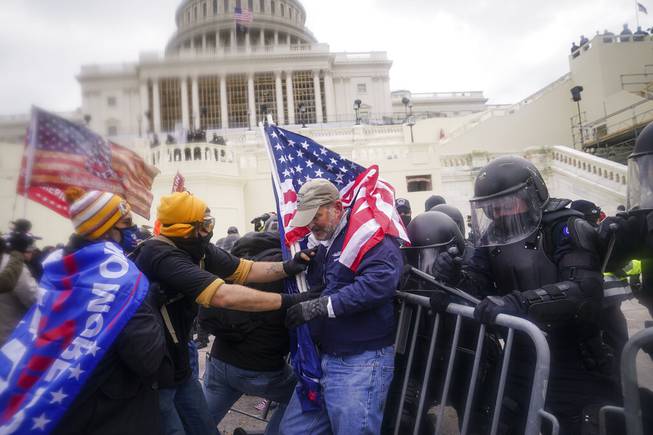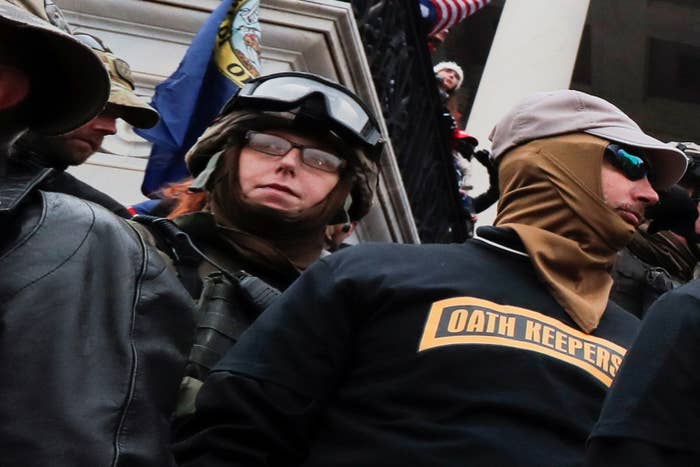LAS VEGAS SUN EDITORIAL:
Americans deserve to know the whole truth about what happened Jan. 6

In this Jan. 6, 2021, file photo rioters try to break through a police barrier at the Capitol in Washington.
Sunday, Feb. 21, 2021 | 2 a.m.
In announcing the establishment of an independent commission to investigate the Jan. 6 attack on the U.S. Capitol, House Speaker Nancy Pelosi took appropriate action.
But a thorough investigation is also critical from the standpoint that Republican Party leaders are warping the truth about the event — downplaying its severity and trying to convince Americans that their alarm over it wasn’t warranted.The nation needs to know much more about the insurrection, particularly how it was fomented and why the Capitol was so lightly protected. Key questions remain, including whether Capitol security forces or Congress and its staff either inadvertently aided the rioters or, more disturbingly, did it knowingly.
It’s important to counter this GOP gaslighting with hard facts.
As is, Republican leaders and their abettors in right-wing media are attempting to normalize the attack and numb Americans to its significance.
Sen. Ron Johnson of Wisconsin provided the latest example, saying he didn’t consider the attack an armed insurrection and was “literally never afraid” as it played out. The whole thing was overblown by the media, he said.
“When you hear the word ‘armed,’ don’t you think of firearms?” Johnson asked. “Here’s the questions I would have liked to ask: How many firearms were confiscated? How many shots were fired?”
Fox News commentator Tucker Carlson made similar remarks in the immediate aftermath of the riot, ridiculing those who were already calling for a major investigation and suggesting that the violence was merely a protest. After showing video of members of Congress calling the riot an insurrection, Carlson smirked: “According to the Honorable Jim McGovern (a Democratic congressman from Massachusetts) and everyone else you just saw on the screen, this was not a protest, how dare you call it that? This was an insurrection. Insurrection insurrection insurrection! Write that a hundred times on the board and don’t forget it. I-n-s-u-r-r-e-c-t-i-o-n. Insurrection. Learn it. Love it.”
With remarks like this, the GOP leadership wants Americans to disbelieve what they witnessed with their own eyes and ears: Law enforcement officers being beaten with bats, flag poles, hockey sticks or whatever kind of club the attackers could get their hands on; people chanting “Hang Mike Pence”; rioters shattering windows and roaming the halls hunting for victims; pipe bombs being discovered; tasers visible in the hands of rioters (including one used on a police officer who suffered a mild heart attack as a result); guns found in a vehicle near the Capitol, and Lord knows how many concealed in the rioters’ clothing.
According to Johnson, Carlson and the like, though, this was just a political gathering where a few of the good ol’ boys and gals in the crowd decided to take an impromptu tour through the Capitol. Yeah, maybe a few of them got kind of riled up, but it was nothing to get excited about. It certainly wasn’t an attempt to stop Congress from certifying the electoral results and overturn the results of the election.
All wrong, of course. This wasn’t just a bunch of cosplay idiots letting off steam, it was an organized assault that left five people dead and dozens injured in its immediate aftermath, including a law enforcement officer. It was the most serious attack on the Capitol since the War of 1812, and it left Americans stunned and agonized over what they’d witnessed.
News that has emerged since the attack adds to the concerns. Law enforcement officers and former military personnel were arrested for allegedly taking part. It’s been revealed that the insurrectionists had been planning the attack on social media, right under the noses of authorities. The former chief of the U.S. Capitol Police claims officials were aware of the threat well before the rally and asked congressional security officials to call in assistance from the National Guard, but were rebuffed.
It’s time to get a full look at what happened.
Pelosi’s plan calls for the establishment of a bipartisan investigatory panel similar to the 9/11 Commission, the successful undertaking that resulted in dozens of hearings and an authoritative 561-page report about the terrorist attack.
The key now is to establish the Jan. 6 commission in a way that is truly independent and bipartisan, which may be a tall order in today’s polarized political environment. But the good news is that both Republicans and Democrats are calling for such an approach.
They owe it to Americans to follow through, especially to the survivors of those who were killed that day and to the many who were injured. Beyond that, the information is important in defending against the GOP misinformation loop that is crippling the country.






















 A wounded man injured in his eye is treated by a medical team following a demonstration against the military coup in Mandalay on February 20, 2021. (AFP)
A wounded man injured in his eye is treated by a medical team following a demonstration against the military coup in Mandalay on February 20, 2021. (AFP)